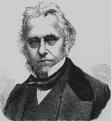Thomas Babington Macaulay 1st Baron Macaulay 1800 - 1859
July 19, 2008
 Thomas Babington
Macaulay
1st Baron Macaulay,
PC
1800 – 1859 was a
nineteenth-century
English poet, historian and
Whig politician and
Member of
Parliament for
Edinburgh. He wrote
extensively as an essayist and reviewer, and on British
history.
Thomas Babington
Macaulay
1st Baron Macaulay,
PC
1800 – 1859 was a
nineteenth-century
English poet, historian and
Whig politician and
Member of
Parliament for
Edinburgh. He wrote
extensively as an essayist and reviewer, and on British
history.
Thomas Babington Macaulay was a member of the Holland House set and a patient of James Manby Gully (Dana Ullman, The Homeopathic Revolution: Why Famous People and Cultural Heroes Choose Homeopathy. (North Atlantic Books, 2007). Pages 107 and 108).
Thomas Babington Macaulay’s father Zachary Macaulay was an abolitionist, due to the influence of his sister Jean and her husband Thomas Babington of Rothley Temple, Leicestershire, a country gentleman and ardent evangelical. Soon after Zachary Macaulay went to stay with them he began to come under their influence. Zachary Macaulay underwent what he described as a conversion experience, and soon became to know Thomas Babington’s associates, among whom were William Wilberforce and Henry Thornton.
From http://www.spartacus.schoolnet.co.uk/PRmacaulay.htm ‘… Thomas Babington Macauley was an extremely intelligent child he began writing poems about historical characters at the age of eight. Thomas Babington Macaulay went to Trinity College, Cambridge in October 1818. Macaulay became friends with other students who held progressive political views including Charles Grey 2nd Earl Grey and Charles Austin (brother of John Austin).
(It was through Charles Austin that Macaulay met John Stuart Mill, Edward Bulwer Lytton and Thomas Carlyle and possibly James John Garth Wilkinson, a friend of Thomas Carlyle).
Macaulay met Ralph Waldo Emerson when he was in London, and he would have been part of the literary society in London at this time, which included Charles Dickens, William Makepeace Thackeray, Alfred Lord Tennyson, Benjamin Disraeli and many others.
Macaulay became very interested in utilitarianism and was influenced by the ideas of Jeremy Bentham and Joseph Priestley. One of Macaulay’s campaigns at university was to bring an end to the rule that forbade a discussion of public affairs at the Student Union later than those of the last century.
Macaulay became a lawyer after he left university. He continued to be interested in politics and in 1824 received publicity for an impressive speech at a meeting of the Anti-Slavery Society. Macaulay also became a regular contributor to the Edinburgh Review, a journal formed by Whig politician, Henry Peter Brougham 1st Baron Brougham and Vaux. Lord Lansdowne was impressed by Macaulay’s articles and in 1830 offered him the seat of Calne, a pocket borough under his control.
On 2nd March 1831, Macaulay made a speech in support of the parliamentary reform measures being proposed by Lord John Russell. It was claimed that Macaulay’s speech was one of the most impressive heard in the House of Commons. Even Robert Peel who was leading the campaign against the Reform Act, praised Macaulay’s contribution to the debate.
In June 1832 Charles Grey 2nd Earl Grey appointed Macaulay as a commissioner of the board of control.
In 1847, Macaulay and Graham were advised by the Select Committee on Medical Registration, where the allopathic advisor bemoaned the fact that ‘… the most eminent subject in the land is the President of a homeopathic Institution…’ Although this act tightened up medical training in the United Kingdom, homeopathy flourished at this time…’